
Photo by Sebastiano Tomada/Getty Images

The first clinical trials testing a human brain-computer interface will soon take place in the U.S.
The company developing the interface, Synchron Inc., is a competitor of Elon Musk’s Neuralink Corp. Synchron Inc. beginning clinicals puts the company on a path toward mainstreaming controversial technology that could have wider use in helping people overcome disabilities and paralysis.
Bloomberg reported that the company’s early feasibility study to determine whether the product is even practical is being funded by the National Institutes of Health. The study is supposed to determine how the device can be integrated with the human brain safely. If all goes according to plan, the clinical trial will be able to assess how people with disabilities or paralysis can control digital devices hands-free.
This trial represents a landmark in that it will be the first clinical trial conducted by a startup working on brain-machine interfaces; should the clinical trial be successful, Synchron will begin working to sell the product.
Synchron’s clinical puts the company ahead of Musk’s Neuralink. Last year Neuralink raised $205 million, while Synchron raised $70 million.
It is believed that brain-computer interfaces have the ability to empower millions of disabled people to more easily communicate with other people and engage in modern life. According to data gathered by the CDC, paralysis affects more than five million people in the U.S. Brain-computer interface technologies theoretically could alleviate some of the difficulties in these people’s lives.
Synchron’s device, once implanted, travels to the brain through the body’s vascular system, whereas Musk’s Neuralink is implanted directly into the receiver’s skull. Once Synchron’s device reaches the brain, parts of the device translate brain activity into signals that allow text messaging, emailing, online shopping, or other various activities using a paired external device.
In the past, brain-computer interfaces have received regulatory approval to treat patients on a temporary basis, but if Synchron’s trial is successful, the company would secure approval from the U.S. Food and Drug Administration for long-term use. If the clinical trial is successful, this technology will take a giant step forward toward commercial availability.
The Synchron study will involve six American patients in New York City and Pittsburgh. The first patient was enrolled this week at Mt. Sinai Hospital in New York. The patient’s identity and demographic information are being kept private.
Should this clinical trial be successful, the next step forward for Snychron will be conducting a wider trial to test for efficacy.